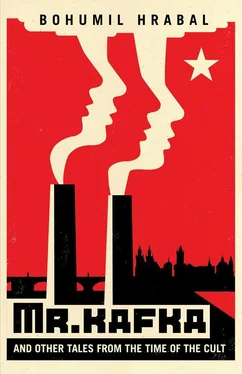The union rep glanced at the shop steward and the manager, leaned delicately against the aquarium, studied the little red and golden fish, then turned around. “But you can’t behave this way,” he said wearily. “We can’t be talking back, we can’t be disobeying government directives.”
“Then, comrade, you should take it up with comrades Krosnář and Zapotocký, because they taught us that the ones upstairs are there to listen to us down here. ‘Face to face with the masses,’ wasn’t that the slogan?” The Dairyman waggled his hand, then turned to the grinders, as if expecting each of them to agree.
The Judge jumped up on the edge of the vat, holding the lines of the control pendant like the reins of a four-in-hand, his white legs protruding from his disintegrating overalls. He walked behind the hoist from which the green demijohn full of hydrochloric acid was suspended. Encased in wicker, the demijohn hung in the air like a green moon. When he saw the senior worker, he teetered for a moment on the rim of the vat like a tightrope walker, but then walked on, pressed the button on the pendant, and brought the hoist to a halt.
The senior worker nodded. “I see you’re getting the hang of it,” he said.
“Indeed,” said the Judge.
Vindy placed a steel bar across the mouth of the vat, raised his hand, and the Judge pressed the button, the right one, lowering the demijohn. Vindy kept his hand in the air until the demijohn settled on the bar and began to tip. He uncorked the neck and the greenish, acrid liquid bubbled into the vat, while the demijohn kept tipping until it was upside down.
“But this plays straight into the hands of the reactionaries,” said the union rep. “By the way, we’ve heard that the former owner of an industrial bakery in Kladno gave his daughter a million crowns for a wedding present. How can that be, I ask, when we all started out with five hundred a month?”
“You’re missing the point, comrade. History will swallow this baker up. Maybe he sold his house and his fields. Maybe he had diamonds and gold coins stashed away. But enough of this, boys,” said the Dairyman, raising his tankard. “Enough! Comrade, you’ve got our shop steward here, and our manager. Just work it out with them the way it’s meant to be done. Send the production manager down here to negotiate the higher quotas directly with us. Even if you don’t know the proper party guidelines, I do. We know very well what the government needs. Come on, boys, let’s go for a beer. There’s no talking to this secretary here, not yet anyway.”
He lifted his tankard and walked off, followed by the grinders. When they reached the tracks, they looked around, and the Dairyman turned to the film director and his men, who were just climbing into the van, and said, “What you just heard? That’s what you should have made your movie about, you peckerheads. The aquarium and birch trees would have been perfect.”
The union rep watched the gang of grinders leave and gave a weak little smile.
“I’m telling you,” whispered the shop steward. “The comrades here in Kladno are sharp as razors.”
“Who the hell was that?” asked the union rep, as the manager slid open the factory hall’s gate.
The female convicts were taking a break on the pile of rusty crucifixes and angels and some other pieces of scrap. The yard engine pulled the loaded hoppers off to the smelting ovens and returned with empty ones. One prisoner with a stoop found some loose metal pickets, handed one to another prisoner, and assumed a fencing stance; the other prisoner faced her and they began making ridiculous lunges at each other. The prisoner with the stoop was driven back up the pile scrap by her opponent, who forced her over the top of the pile and back down the other side, while the other women hooted, clutching their sides, hugging each other, hanging on each other’s shoulders like dray horses resting against each other on lunch break, roaring and howling with laughter.
“I’m going to die,” shrieked Lenka.
“Here’s what I know,” said the shop steward. “The Dairyman — we call him that because he owned a milk bar, but he voluntarily shut it down and went to work in the mines, then came here as a grinder — he’s our best worker and a dedicated communist but what can I say? He’s a Kladno boy. When a mother’s in the pink, none of her children want to fetch her wood and water, but when she’s sick, the children fight over who gets to help out first, if you catch my drift.”
“When she’s sick, when she’s sick…” said the union rep thoughtfully. “But when she does get sick, that might also be too late, don’t you think?”
“Girls! Girls!” the young guard said quietly, standing there, pale and ashen-faced, his fingers hooked into his Sam Browne belt.
At a signal from Vindy, the Judge pressed the right button, and the demijohn turned upright again. The Judge then continued along the edge of the vat, pressed the proper button and the demijohn moved on through the acrid vapor.
“Very good,” said the senior worker, and he smiled.
Vindy walked over the wobbling planks to the demijohn and into the cloud of vapor now enveloping Judge Hasterer. “Things are improving in the realm of the spirit!” he shouted.
The crane clanked along the length of the hall, and the sun was already so low in the sky that the ribbons and bands of light from the ventilation tower had shifted from the walls to the ceiling, where they glowed like golden sword blades. The crane pushed its way through blue shadows and semi-darkness, and the load binder raised his arm, his blue coveralls blending in with the blue shadows in the hall. He stopped the union rep, who put his finger to his lips and watched as an old worker lifted up a crowbar, lay it against his cheek as if aiming a rifle, and when the crane operator drew closer, he shouted: “Bang!”
The union rep watched the blonde operator fling her arms in the air as though she’d been winged, then lay her bleached head on the edge of the gondola, sagging for a moment, and then gently rising to her feet, rattling the chain. She laughed at the worker as her crane rumbled over his head.
“There are some strange people here,” the union rep said, as he turned to watch the crane recede down the factory hall. “So, just to be perfectly clear,” he said, and he looked a moment longer at the receding gondola, then put his arms around the shoulders of the steward and the manager and stuck his head between them. “First, send the production manager down here right away to negotiate the higher quotas. Next, put a message up on the board that the old quotas apply, for now. And third, how old did you say this Dairyman was?”
At that moment, the public address system started broadcasting a waltz, and the female convicts tossed aside their pickets. They converged on the wagons and began dancing with each other on a patch of hard clay. The girl with her arm in a cast ran down as well and, lifting her cast in the air, embraced it with her healthy arm and waltzed with herself.
“She’s one of them defectors,” said the senior worker.
“That, sir, is my daughter,” said the Judge, bowing slightly.
“Now girls!” said the pale, somewhat alarmed guard. “Girls!”
The young guard stood outside the room where they stored fire-clay piping. His thumbs hooked into the Sam Browne belt supporting a holstered revolver, while he watched the female prisoners unload the large fire-clay conduits. Beside him a willow tree — its pussy willows stripped by human hands each spring — was struggling to recover. The guard gazed at the mountain of wartime scrap; at the piles of fire-blackened metal hospital beds, gutted x-ray machines, cardiographs, and other medical devices; at a stack of disabled typewriters, the consequence, he assumed, of a direct hit on a typewriter factory, their keys grinning in the sunlight like teeth in a dead man’s skull. Scattered among the mangled letters were tiny beads of greenish glass, the remnants of windows melted in a fire-bombing that had consumed everything, even the cobblestones and the very air itself. A child’s crib sat on top of the pile of typewriters, and fixed to the metal headboard was a colored tinplate print depicting a little girl in a white dress walking across a chasm on a narrow footbridge. Hovering above the girl, almost touching her back with its hands, was a guardian angel, also in white, with two large wings, like twin brides. The young man’s complexion was pale, and he had deep creases, like knife scars, on each side of his mouth. He stared at the picture, took out a pocket watch, paused a moment, guessed it was one o’clock, then looked at the dial, but as usual he was half-an-hour off. Two workers in aprons pushed a dolly into the storeroom and began to stack it with the fire-clay conduits the female prisoners had unloaded.
Читать дальше












